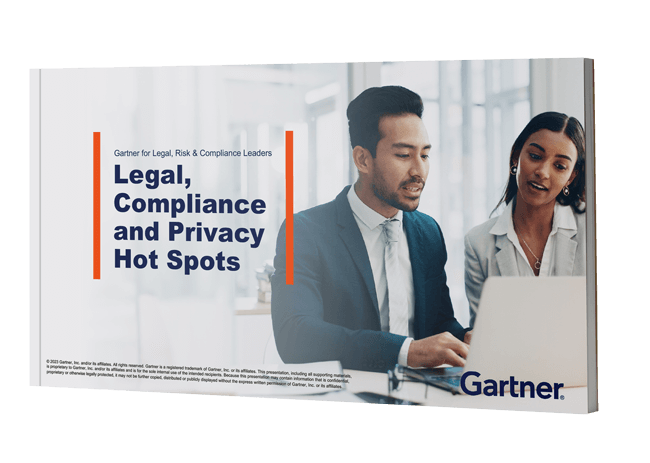Effectively identify, prioritize and manage emerging legal risks
- Gartner client? Log in for personalized search results.
Legal Risk Management: Top 12 Hot Spots

Strengthen your legal risk management program in 2025
Rapid generative AI adoption, growing corporate self-regulation pressures, and expanding ESG third party reporting requirements are among the top risks that legal leaders will prioritize in 2025.
Download an excerpt of the "Legal Hot Spots Report" to explore the 12 most important risks and opportunities affecting legal departments, driven by three key themes in the business environment:
- The arrival of generative AI
- Growing demands for corporate transparency and fairness
- The corporate impacts of societal rupture
About Legal Risk Management
Recent changes to the risk landscape have introduced increased need for legal leaders to build effective risk management programs in 2025.
However, as organizations face an increasingly complex, dynamic and volatile landscape, legal leaders are often unsure how to effectively identify, prioritize and manage emerging risks. Organizations need the right inputs to identify potential risks and a framework for determining when action should be taken, in order to prevent emerging risks from becoming a threat to organizational objectives.
To help legal leaders understand emerging risks and opportunities in the current environment, we’ve identified 12 emerging risk trends (hot spots) that legal leaders should anticipate and prepare for in the coming years.
Legal Risk Management FAQs
What is legal risk management?
Effective legal risk management is a critical driver of business goals. To succeed, legal leaders must ensure effective and timely risk assessment, monitoring, mitigation and reporting. This increases stakeholder trust, supports business growth and improves corporate decision making.
What is legal's role in risk management?
In 2025, legal leaders must help their organizations address the right risks to foster growth while building resilience to disruptions and efficiently managing and mitigating operational risks. To achieve this, legal leaders must:
Create a process to identify new risks and requirements, define their implications, and build efficient, resilience-focused risk strategies.
Set risk guidance in the context of their business’s risk appetite for key objectives and cascade that throughout their departments to ensure consistent, risk-aligned support.
Streamline processes and coordinate with other functions to minimize the business burden of risk management and provide a consistent view of risks to objectives.
How can I achieve a world-class legal risk management program?
In an increasingly complex risk landscape, organizations rely on timely, accurate risk information to inform decision making. Legal leaders are central to providing the organization with this risk information.
To achieve a world-class risk management program, legal leaders should follow three principles – aligning risk taking to business needs, managing risks at the right time and creating a culture of risk ownership. By adhering to these principles, General Counsel will be able to provide their organizations with accurate risk information and effectively manage top risks at their organizations.